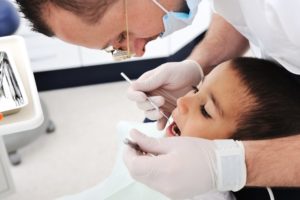 Even though we like to believe that our kids can’t get cavities, the truth is that pediatric cavities are far more common than we think. The CDC estimates that 42% of all children ages 2 to 11 have a cavity in their baby teeth—-making tooth decay in children five times as common as asthma, and seven times as common as hay fever. So what do you when you think that your child may have a cavity?
Even though we like to believe that our kids can’t get cavities, the truth is that pediatric cavities are far more common than we think. The CDC estimates that 42% of all children ages 2 to 11 have a cavity in their baby teeth—-making tooth decay in children five times as common as asthma, and seven times as common as hay fever. So what do you when you think that your child may have a cavity?
When you suspect a cavity
- Treat the pain the best you can. Remember you can’t always see the cavity in your child’s mouth. Even if the cavity is in a baby tooth, make an appointment so the dentist can treat the cavity. Untreated cavities can result in long-term damage, and can even affect their adult teeth.
- Make an appointment with the dentist. Get your child into the dentist as soon as possible. Make sure you choose a dentist that’s good with kids and talk to your child about the appointment so they are not afraid. Let the dentist know if you have a high incidence of tooth decay that runs in your family.
- Ask your dentist how future cavities can be prevented. Your dentist may have suggestions that can help prevent future cavities or recommend more frequent appointments to monitor and prevent future tooth decay.
How to prevent a cavity
- Get your kids to the dentist early. The American Dental Association recommends kids see the dentist by their first birthday. Don’t put off that first appointment.
- Start teaching your kids good brushing habits and flossing early. Make brushing and flossing fun! Take your kids shopping and have them pick out toothbrushes, toothpastes, and flossers. Use a chart so your kids can track each time they brush and floss. Stay with them in the bathroom to make sure they brush—and brush long enough. Show kids these fun videos or download one of these cool apps to make brushing for two minutes fun.
- Don’t stray from a regular hygiene routine. When life gets busy or you’re on vacation, it can be really easy to forget to brush and floss. Once you have set a routine twice-a-day brushing schedule with your kids, do everything you can to stick to it. Set alarms with cool ring tones to remind them to brush twice a day and make sure other caregivers (i.e. babysitters, nannies, grandparents, etc.) are helping your kids brush as well.
- Choose a good dentist and make your kids look forward to the appointments. Make your kids look forward to seeing their dentist. Be very selective and choose a dentist that’s good with kids. That dentist doesn’t have to be a pediatric dentist; a “regular dentist” (for adults and kids) can be their friend and dentist for life. Talk to your child about the dentist before you go (and what’s going to happen). Practice the dentist appointment with your child at home to make them more comfortable. Read books about the dentist before you head in, and watch videos about healthy teeth to make them look forward to it.
- Don’t skip a dentist appointment. We’re going to state the obvious: life can get really, really busy. Schedule a cleaning for you and your kids twice a year, and make sure you keep the appointments.
- Minimize sodas and sweetened drinks. Sweetened drinks contain sugar which can mingle with bacteria in your child’s mouth to form acid. The acid from this reaction attacks teeth and can decay outer and interior tooth enamel. Avoid soda and sweet drinks as much as possible; when your child does have a sugary drink, have them drink water after and make sure they brush and floss to keep cavities at bay.





